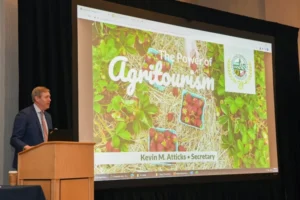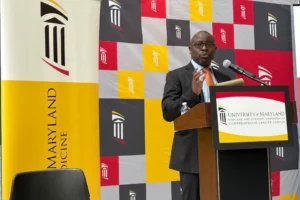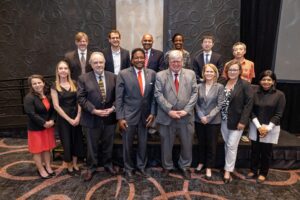Updated law school offerings include coding, professional development
Published 8/16/19 in the Daily Record
Students at Maryland’s two law schools will be able to take advantage of new offerings this academic year as professors strive to prepare them for the changing landscape of the legal profession.
The University of Baltimore School of Law is taking its post-J.D. certificate in family law program online, while the University of Maryland Francis King Carey School of Law’s online master of science in law programs will be expanded to provide better access and resources for off-campus or out-of-state students.
UB Law will also add an introductory Coding for Lawyers class in the fall semester and will introduce a Legal Data and Design clinic in the spring.
The new offerings are designed to help students succeed once they begin their careers.
“We’re trying to get students to learn how (coding) can be integrated to practice,” said Professor Colin Starger, who will co-teach UB’s Coding for Lawyers class this fall with Matt Stubenberg, the associate director of legal technology at the Access to Justice Lab at Harvard Law School. (Stubenberg formerly worked as IT director at the Maryland Volunteer Lawyers Service and created the expungement website MDExpungement.com.)
Starger worked as a computer programmer before attending law school and focusing on social justice issues. But as the scope of legal education changed — Georgetown University Law Center in 2016 created the first coding class for lawyers — Starger recognized a growing need for technological literacy within the legal community and returned to his programming roots.
“I’ve been writing code to advance my academic research and clinical work for a while now,” Starger said in a news release from the UB School of Law. “It seems like the right time to engage more students in technology-assisted practice. It’s what the market wants and what social justice needs.”
Starger and Stubenberg will teach programming with Python, a language popular in data science, but Starger said the choice of programming language was not as important as learning the principles behind coding.
“Right from the beginning, we frame it in terms of legal problem-solving,” Starger said.
Starting next spring, UB’s new Legal Data and Design Clinic will allow students to use what they learned in Coding for Lawyers to help criminal justice stakeholders improve their practice, Starger said, adding that the data they will be working with comes from a former law clinic focused on pretrial matters.
Starger said he hopes the new clinic will build on the success of the pretrial clinic and help develop “ways to better understand what’s going on in the criminal justice arena.”
Starting this fall, UB Law’s Post-J.D. Certificate in Family Law program will be offered online. According to program director Professor Barbara Babb, the goal of the online program is to increase access in Maryland and nationwide. Babb said the program is designed both for new attorneys and for experienced attorneys who are looking to add family law to their practice.
The post-J.D. family law certificate program is the only one of its kind in the country, said Babb, who emphasized the importance of understanding family law: “Family law cases in Maryland and nationwide are the most prevalent type of case that the court system is handling. … There really is a need for attorneys to have this interdisciplinary expertise.”
While the certificate program will be offered online, courses will be offered at specific times of day. Students from out of state are encouraged to enroll, but they must meet the requirements for admission to the Maryland bar.
The University of Maryland School of Law will expand its professional development lecture series to students enrolled in its online master of science in law (MSL) programs offered in Cybersecurity Law and Homeland Security and Crisis Management Law. The lecture series, which is non-credit-bearing, has previously been offered only to on-campus students.
José Bahamonde-González, associate dean for professional education and pro bono initiatives, developed and designed the lecture series. He said that the series aims to educate students on responsible conduct and that lectures will include advice on making mid-career transitions and navigating professional communications online and on social media.
The professional development lecture series was expanded at the request of MSL students. Bahamonde-González said the school received many questions about formatting resumes and LinkedIn profiles and wanted to open the opportunity to learn these skills to all students.
“I wanted to make sure people had that support,” Bahamonde-González said.



